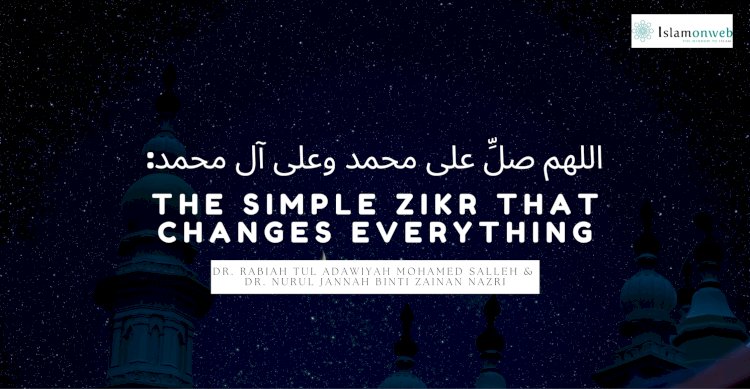اللهم صلِّ على محمد وعلى آل محمد : The Simple Zikr That Changes Everything
As a Muslim living in a Muslim-majority country like Malaysia, ṣalawāt (sending blessings upon Prophet Muhammad ﷺ) by utteringوعلى آل محمد اللهم صلِّ على محمد (O Allah, send blessings upon our Prophet Muhammad) is not something foreign to us. From a young age, we’ve been told to recite it in ṣalah (prayer), at gatherings, and during religious ceremonies. It’s a familiar part of Islam, almost our very second nature. Yet, for many of us, it’s a habit taught in a didactic way—“You must do this because it’s important.” While well-intentioned, this approach sometimes doesn’t convey just how transformative and profound ṣalawāt truly is.
Ṣalawāt is far more than a routine obligation in ṣalah (prayers). It is an extraordinary act of worship that brings blessings, forgiveness, and closeness to Allah while strengthening our connection to the Prophet Muhammad ﷺ. In various ḥadīths, the Prophet ﷺ mentioned countless virtues of reciting ṣalawāt . However, in these contemporary times, many of us may not fully understand its significance or realise just how profound it truly is.
In this piece, what my co-author and I hope to achieve is to contextualise these virtues in a way that makes them more relatable. Our goal is to help us all—ourselves included—grasp and internalise how magnificent this act of ṣalawāt really is.
A Personal Reflection
Let me begin with a humble admission: I am not a scholar in Islamic studies—though I work at an international Islamic institution that strongly encourages the integration of all fields with Islamic knowledge. Here, Islamic knowledge serves as the guiding soul of all that we learn and teach to our students.
I am a linguist by training, but that doesn’t fully define who I am. At the core, I see myself first and foremost as a believer—one who strives, often imperfectly, to live by the teachings of our beautiful religion. What I share here is drawn from my reflections and experiences, with the hope that it may resonate with others.
Given this, we must always bear in mind that knowledge must be respected, and when it comes to hadith, it is crucial to consult an expert. That’s why I’m honoured to have Dr. Nurul Jannah Zainan Nazri, an expert in ḥadīth studies, as the second author of this piece. She has carefully checked and validated all the ḥadīths and their interpretations to ensure they are accurate and reliable.
- Allah Sends Salawāt to the Prophet ﷺ: An Exalted Honour
When we reflect on the virtues of salawāt, it’s essential to start with something truly remarkable: Allah Himself sends salawāt upon the Prophet ﷺ. This is not merely symbolic—it’s a powerful indication of the unparalleled status of the Prophet ﷺ.
Allah declares in the Qur’an:
إِنَّ ٱللَّهَ وَمَلَـٰٓئِكَتَهُۥ يُصَلُّونَ عَلَى ٱلنَّبِىِّ ۚ يَـٰٓأَيُّهَا ٱلَّذِينَ ءَامَنُوا۟ صَلُّوا۟ عَلَيْهِ وَسَلِّمُوا۟ تَسْلِيمًا
“Indeed, Allah and His angels send blessings upon the Prophet. O you who have believed, ask [Allah to confer] blessing upon him and ask [Allah to grant him] peace.” (Surah Al-Ahzab: 56)
This verse is truly mind-blowing. Think about it for a moment: Allah, the Creator of the heavens and the earth, who is Al-Ghaniyy (The Self-Sufficient, Free of Need), who has no need of anything, chooses to engage in the act of sending blessings upon the Prophet ﷺ. The Arabic verb يُصَلُّونَ (translated as send blessing) in the verse is in the present tense, meaning this is an ongoing, continuous action. Even as you read this now, Allah is sending blessings upon the Prophet ﷺ.
I always strive to connect what I learn from the Qur’an and ḥadīth to our human experiences. By doing so, I gain a deeper appreciation and can relate personally to the lessons. In this context, imagine a king or a world leader. It is universally acknowledged that they rarely act personally, often delegating even the smallest tasks to their subordinates. Their lofty status keeps them far removed from ordinary acts.
Now, of course, Allah is beyond any human comparison, but to help us gain perspective, consider this: Allah, al-Mālik al-Mulūk—the Absolute King of all kings—engages directly in sending ṣalawāt upon the Prophet ﷺ. This is a remarkable expression of the unparalleled honour and status of Prophet Muhammad ﷺ.
If Allah Himself does this, how can we, His humble servants, not follow suit?
- Ṣalawāt: A Solution to Our Worries and Forgiveness of Sins
Problems and worries are an integral part of human existence. As long as we are still breathing, none of us are spared from the trials of life. These trials manifest in various forms, whether big or small, and often we find ourselves juggling both major and minor concerns at the same time. Worry, discomfort, and unease are hallmarks of the human condition.
However, Allah, in His infinite mercy, has provided us with a miraculous remedy for these troubles. This remedy is beautifully encapsulated in a ṣahīh ḥadīth narrated by Ubayy ibn Ka‘b (may Allah be pleased with him):
Ubayy ibn Ka‘b (may Allah be pleased with him) approached the Prophet Muhammad ﷺ and said:
“O Messenger of Allah, I want to dedicate more of my supplication to sending blessings upon you. How much of my dua should I devote to this?”
The Prophet ﷺ replied: “As much as you wish.”
Ubayy asked: “A quarter?”
The Prophet ﷺ responded: “As much as you wish, and if you increase it, it is better for you.”
Ubayy then asked: “Half?”
The Prophet ﷺ said: “As much as you wish, and if you increase it, it is better for you.”
Finally, Ubayy said: “I will dedicate all of my supplications to sending blessings upon you.”
The Prophet ﷺ then said: “If you do so, Allah will suffice you concerning your worries and forgive your sins.” (Jami at-Tirmidhi 2457- ḥasan)
This hadith highlights the power of ṣalawāt. By dedicating our time to sending blessings upon the Prophet ﷺ, Allah promises two incredible outcomes:
- Our worries will be removed.
- Our sins will be forgiven.
Worries, as mentioned earlier, are an inevitable hallmark of human existence. No matter who we are—wealthy or poor, healthy or sick, young or old — every one of us desires a life free of burdens. This universal longing is evident in the countless self-help programs and well-being industries promising to sell the idea of a “happy, worry-free life.”
However, the solution presented in this ḥadīth is so illogically simple. By prioritising ṣalawāt, we are offered a remedy to the very struggles that define our lives. It teaches us that ṣalawāt is not just an act of worship—it is a channel to obtain Allah’s mercy and to offload our burdens onto the One who truly understands and alleviates them. Through ṣalawāt, we find a path to peace and relief from the challenges of this world.
- A Means to Forgiveness and Higher Ranks
One of the most remarkable aspects of ṣalawāt is its ability to erase sins and elevate our spiritual status. The Prophet ﷺ said:
“Whoever sends blessings upon me once, Allah will send blessings upon him tenfold, forgive ten sins, and raise him ten degrees in status.” (Sunan an-Nasai 1297- ṣaḥiḥ)
We live in a time where sins—both intentional and unintentional—surround us constantly. Reflecting on the stories of the people of the past, we find that for them to engage in sin often requires deliberate effort or physically stepping out of their way. In contrast, for us, sins infiltrate our lives effortlessly.
Our phones, for instance, bring temptations directly into our hands, exposing us to inappropriate content or distractions that draw us away from Allah. Even billboards advertising products often feature immodest images, passing in daily life as though they are perfectly normal. Such widespread exposure normalises sin, making it harder to maintain purity in our hearts.
This is why we, more than the past generations, are in urgent need of constant purification and Allah’s forgiveness. Thankfully, ṣalawāt offers a simple yet powerful way to cleanse our hearts.
- Proximity to the Ultimate VIP
In this world, we know how valuable it is to have connections to influential people. Being close to a Very Important Person, a VIP—a president, a prime minister, or a business mogul—can open doors to opportunities we’d never have access to otherwise. Just being in their circle can change our lives.
Now imagine the Day of Judgment, a day so overwhelming that even the closest bonds will dissolve. The Qur’an paints a vivid picture of this moment in Surah Abasa (Chapter 80: 34-37):
يَوۡمَ يَفِرُّ الۡمَرۡءُ مِنۡ اَخِيۡهِۙ ﴿80:34﴾ وَاُمِّهٖ وَاَبِيۡهِۙ ﴿80:35﴾ وَصَاحِبَتِهٖ وَبَنِيۡهِؕ ﴿80:36﴾ لِكُلِّ امۡرِیءٍ مِّنۡهُمۡ يَوۡمَـئِذٍ شَاۡنٌ يُّغۡنِيۡهِؕ ﴿80:37﴾
“On the Day a man will flee from his brother, and his mother and his father, and his wife and his children. For every man, that Day, will be a matter adequate for him”.
On that day, ṣalawāt becomes a means of securing proximity to the greatest VIP of all creations: Prophet Muhammad ﷺ. The Prophet ﷺ said:
“The closest of people to me on the Day of Resurrection will be those who send the most blessings upon me.” (Jami at-Tirmidhi 484 -ḥasan)
Being near the Prophet ﷺ means gaining access to his intercession on the Day of Judgment—a day when we will need it more than anything else.
- A Mind-blowing Reality: The Prophet ﷺ Responds to Our Salam
One of the most awe-inspiring aspects of ṣalawāt is revealed in this ḥadīth:
“There is no one who sends salām upon me but Allah returns my soul to me so that I may respond to his salām.” (Sunan Abi Dawud 2041- ḥasan)
Every time we send salām upon the Prophet ﷺ, Allah returns his blessed soul to him so that he can personally respond to us. This isn’t a metaphor—it’s a literal event that happens every single time a Muslim greets the Prophet ﷺ. For me, this ḥadīth is very comforting. It demonstrates the close connection Allah has established between us and His Messenger ﷺ. Regardless of the thousands of years or the vast distance that separates us from the Prophet ﷺ, even if we haven’t seen or met him, our ṣalawāt will always reach him. It’s a beautiful reminder that no act of worship—no matter how small—ever goes unnoticed.
- Allah’s Salawāt Upon Us: A Name in the Most Noble Gathering
One of the most astounding aspects of salawāt is its reciprocal nature. When we send blessings upon the Prophet Muhammad ﷺ, Allah sends blessings upon us in return. This is affirmed in a ḥadith where the Prophet ﷺ said:
“Whoever sends blessings upon me once, Allah will send blessings upon him ten times.” (Muslim 408- ṣaḥīḥ)
Scholars explain that Allah’s ṣalawāt signifies His praise for the individual in the presence of the noble assembly of angels. To illustrate this, imagine if a world leader, like the President or the Prime Minister were to mention our name during a press conference. The impact would be extraordinary. People would seek our friendship, opportunities would pour in, and our life would be transformed by the mere mention of our name.
Now think about this on a far grander scale. When we send ṣalawāt, the Absolute King of all kings—Allah Himself—mentions our name in the company of angels. The magnitude of blessings that follow is beyond what we can comprehend.
A Life-Changing Experience with Salawāt
Salawāt has been my anchor throughout my life. Among the many experiences that have deepened my faith in its blessings , there is one that stands out.
In December 2024, Malaysia experienced one of the most devastating floods in its history. Among the state’s worst affected was the area where my late husband’s house is located—a house positioned precariously in front of a river. It was the most vulnerable property in the area, and the risk of it being flooded was almost certain. My children and I, being far away in Kuala Lumpur, could do nothing to physically protect it. Feeling helpless, I turned to what I could do: salawāt Ibrahimiyyah -the best and most authentic salawāt taught by our beloved Prophet ﷺ.
I reached out to family members in the area to check on the house, but they too were grappling with the overwhelming floods that had affected their own homes. Understandably, their priority was to protect their loved ones and belongings. Moreover, since the house had been unoccupied since my husband’s passing, it wasn’t considered an immediate concern to them—after all, no one was living there. I recited as much salawāt as I could, placing my complete trust in Allah.
When the waters finally receded days later, family members managed to check the house, and Subḥanallah, not a single drop of water had entered. Every house surrounding it had been flooded, yet this one remained untouched.
Before this experience, I always thought of ṣalawāt as something that works in a more spiritual and intangible manner—bringing ease, removing burdens, and lifting our spirits, much like the ḥadith narrated by Ubay bin Kaab (may Allah be pleased with him) (see Section 2). However, what I realised through this experience is that Allah doesn’t just remove our worries—He solves our problems in very real, tangible ways. When we place our trust in Him, the outcomes can be truly miraculous.
Making Salawāt Part of Daily Life
In our busy lives, it’s easy to feel overwhelmed by the idea of adding more acts of worship. However, salawāt is simple and deeply rewarding. With some intention and planning, it can easily become a meaningful part of our daily lives. Here are some tips:
a. Incorporate It into Daily Routines
Recite salawāt after every ṣalāh (prayer), in the morning and evening adhkār, during commutes, or while doing household chores. If we can allocate time for worldly activities, we can surely dedicate time for ṣalawat. Being proactive is key—don’t just go with the flow.
b. Set Daily Goals
Start with a goal of 10 ṣalawāt in the morning and evening adhkār, then gradually increase the number as it becomes a habit. Consider creating a dhikr journal to record the daily adhkār we aim to recite, based on authentic Sunnah, such as those found in The Fortress of the Muslim (Ḥisn al-Muslim), including ṣalawāt. Setting a minimum target can help maintain consistency. This intentional approach helps structure our worship and strengthens our connection to Allah.
c. Use Technology Wisely
Set reminders on our phone or use a tasbih app or counter to track our recitations.
d. Reflect on Its Meaning
Don’t just recite mechanically. Pause and reflect on the blessings we’re sending upon the Prophet ﷺ and the immense rewards Allah promises in return. As believers, we are meant to be proactive and intentional in our worship, striving to optimise our time and efforts to please Allah.
A Privilege Unique to This Ummah
Salawāt is not just a ritual. It is a gift and a privilege exclusive to the Ummah of Prophet Muhammad ﷺ. No other Prophet’s followers were granted this special act of worship. This exclusivity reflects the unparalled status of the Prophet ﷺ and the immense love Allah has for his ummah.
Let us not underestimate this simple yet extraordinary act. Start small but start sincerely. As you send blessings upon the Prophet ﷺ, remember that Allah sends blessings upon you, the Prophet ﷺ responds to your greeting, and your name is mentioned in the most noble gatherings. What greater honour could there be?
About the authors:
Dr. Rabiah Tul Adawiyah Mohamed Salleh is Assistant Professor at the Department of English Language and Literature, International Islamic University Malaysia. She is deeply committed to integrating Islamic principles into the field of linguistics, with a focus on spiritual reflections and their practical applications in daily life. Her research and writings frequently explore the intersections of faith, language, and culture, aiming to inspire and guide readers through Islamic perspectives.
Dr. Nurul Jannah binti Zainan Nazri is Assistant Professor of Qur’an and Sunnah Studies at International Islamic University Malaysia (IIUM). She is passionate about ḥadīth text criticism, contemporary issues in the Tafsīr and Ḥadīth, environmental and scientific concerns, gender studies, and sociology. With a keen analytical perspective, her work explores the complexities of these fields, engaging both classical scholarship and modern challenges. She has presented her research at international conferences worldwide and has made significant contributions to books and academic journals, fostering meaningful discourse in her areas of expertise.
Disclaimer
The views expressed in this article are the author’s own and do not necessarily mirror Islamonweb’s editorial stance.
1 Comments
-

Jazakillahu khairan..Sistr; This is very inspiring, mashaAllah. May Allah Almighty give you abundant rewards and may your status go up in this world and in the Afterlife. Every Muslim should enlighten their life in the light of this Iman awakening article that instills the Love of our Leader and Beloved Nabi Sallallahu Alaihi wa Aalihi wa Sallam..kathiran kathira.
























Leave A Comment